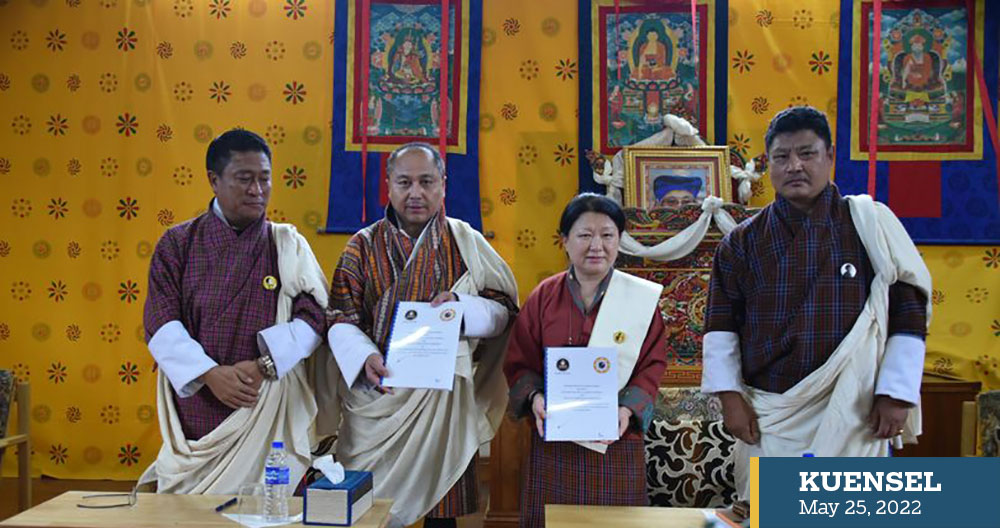Rinzin Wangchuk
The government’s legal arm, the Office of the Attorney General (OAG) reviews cases pertaining to corruption referred by the Anti-Corruption Commission (ACC). The OAG prosecutes or dismisses the case depending on several factors, including evidence provided.
If the case doesn’t warrant prosecution for whatever reasons, the state prosecutor returns the case to the investigating agency reasoning the grounds why such cases cannot be pursued before the court.
If the OAG drops or dismisses a case, ACC could invoke section 128 (3) of the Anti-Corruption Act (ACA), which authorises them to prosecute a case. This happens when investigation findings with strong grounds convince the anti-graft commission to take up the prosecution role.
The rules of the game are clear, but the apparent lack of communication or coordination between the two constitutional institutions have led to controversies, some blaming the ACC for vindictiveness in pursuing cases.
Lack of high level bi-lateral talks between the two Constitutional institutions, according to observers, resulted in controversies leading to public debate on their mandates and the issue of constitutionality.
The issue of ACC prosecuting cases became a bone of contention not only between the OAG and ACC but two houses of Parliament – National Assembly and National Council – that have been debating whether to retain or repeal the impugned section 128(3) since 2011. The Anti-Corruption (Amendment) Bill 2021 is expected to be enacted in the Parliament session, which begins next week.
Moving forward
Such controversies, however, will become a matter of the past with the signing of a memorandum of understanding (MoU) between ACC and OAG on May 23. The two institutions will strive to ensure better partnership and collaboration on prevention, investigation and prosecution of corruption cases.
The trend of ever-increasing corruption in the country, according to a joint press release from OAG and ACC, poses great threat to the fulfilment of national goals as integrity and good governance form the very bedrock of sustainable progress and prosperity for the people.
The MoU signed by ACC’s Chairperson, Deki Pema and OAG’s Attorney General, Lungten Dubgyur provides a framework for professional communication and collaboration between the two agencies to work closely in the best national interest of the country.
The joint press release stated that both the OAG and ACC regret the lack of inter-agency coordination in the past and are committed to a new chapter of open communication and collaboration going forward, towards fulfilling the respective Constitutional mandates and serving the Tsawa-Sum.
“Our Constitution is clear that fighting corruption is a collective responsibility as indeed it is only with the whole-of-society approach that corruption can be tackled successfully,” the press release stated. “In this, it is imperative that the ACC and OAG, which have key roles to fulfil in the vital fight against corruption, work in tandem for the larger national interest.”
A Thimphu resident who had been following the debates on “constitutional or unconstitutional” over the past decade opined that there wouldn’t be parallel prosecutions had these two agencies partnered and collaborated from the very beginning. “Looking at the MoU signed by two agencies, it indicates that ACC may not prosecute the case,” he told Kuensel.
Although the ACC investigated and successfully prosecuted the Gyalpoizhing land case in 2012 and the recent Trongsa land case, it was not related to delay without valid reasons, manipulated or hampered by interference as per the ACC Act. The OAG dropped the Gyalpoizhing case reasoning ACA 2011 does not provide any overriding clause or any unbridle power to ACC to review and investigate the past actions.
In the recent Trongsa case, OAG found no merits to initiate any of the recommended criminal proceedings against the alleged suspects as the alleged transactions were found to have been caused due to administrative lapses of the state and failure of a few individuals who had died before ACC’s investigation.
Constitutional issue
In 2012, when ACC took up the prosecution role in illegal allotment of Gyalpoizhing land, some legal experts challenged that the constitutional responsibility of prosecution is solely vested with OAG and not with the ACC. Two former judges and a serving justice, who was involved in drafting the Constitution interpreted it as “unconstitutional” for the ACC to play the role of prosecution although the Supreme Court in 2013 stated that the Section 128(3) is not ultra vires to the Constitution.
In his interpretation of the section 128(3) and the Article 27 of the Constitution shared with the media in March 2013, the justice, who is a constitutional expert, stated that there should not be any hesitation on the part of the constitutional court to declare section 128 as unconstitutional.
He stated that Article 27 of the Constitution provides that the Commission be acting as the preventive agency to curb corruption in the country. This same article of section 5 provides the OAG to be a prosecuting agency on the findings of the Commission. “The Constitution therefore, has not committed itself providing the power to prosecute before the court of law,” he stated in his paper. “The rules of ascendancy must give way to the respective assigned duties of the constitutionally recognized bodies.”
He also stated that when people become the victim of institutional emotions, the judiciary must come into play as the referee to draw a reasonably constitutionally acceptable doctrine reflecting the true virtues of justice. “The time has come to show the people of Bhutan that the judiciary can protect liberty through proper interpretation of the laws,” he stated.


